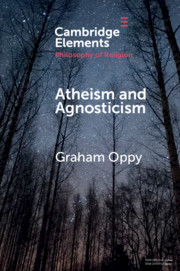Element contents
Atheism and Agnosticism
Published online by Cambridge University Press: 31 May 2018
Summary
Keywords
Information
- Type
- Element
- Information
- Online ISBN: 9781108555340Publisher: Cambridge University PressPrint publication: 17 May 2018
Bibliography
Accessibility standard: Unknown
Why this information is here
This section outlines the accessibility features of this content - including support for screen readers, full keyboard navigation and high-contrast display options. This may not be relevant for you.Accessibility Information
- 20
- Cited by
